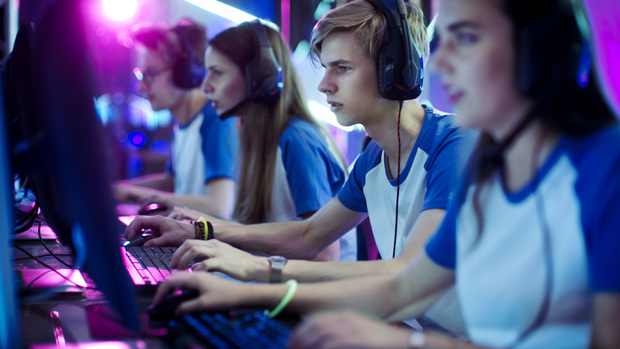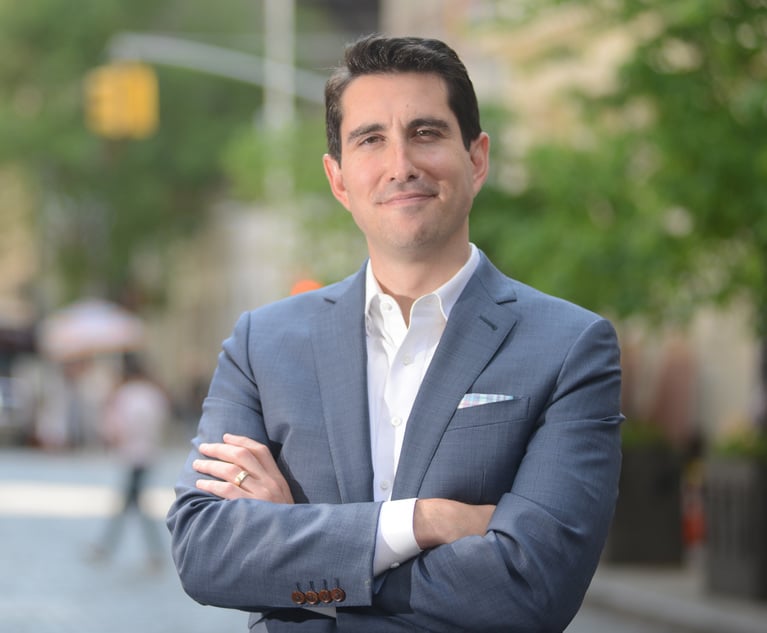Gaming Lawyers Tackle Industry Hurdles And What's Next At Fenwick & West Panel
In-house and outside counsel discussed the gaming industry's legal challenges -- including clones and player IP use -- on a panel Wednesday.
November 07, 2018 at 11:36 PM
3 minute read

Legal players from across the gaming industry discussed their latest battles and the challenges ahead for them on a Wednesday panel.
The Fenwick & West and Berkeley Center for Law & Technology 2018 Gaming Summit in San Francisco brought together a combination of in-house and outside gaming counsel for a panel on intellectual property and legal considerations in the industry.
Panelist Dan Nabel, principal counsel of League of Legends-creator Riot Games, said concerns over cloning games have been on his radar recently. Cloners create similar versions of already existing games, often generating revenue from ads they place within the copied version.
“Cloners are getting way more sophisticated because they're getting way more money. So now that we have this skyrocketing business, you have way more sophistication in the space, which makes things way more challenging to deal with, I think particularly for smaller companies,” Nabel said.
Nabel said that in order to get clones taken off gaming platforms, lawyers often have to produce thousand-page documents with side-by-side comparisons of the two games. That's in part because one similarity on its own may not show the two games are clones, but taken as a whole the aesthetics or gameplay are noticeably alike.
It's also been a challenge to replicate the way that gameplay is similar, especially in court, he said.
Another panelist, Chrissie Scelsi, the U.S. General Counsel for Wargaming (USA), Inc., agreed, and said it's helpful to be able to show comparisons of the two games via gameplay.
“If you have a case with [cloning], the best thing you can do is not only get the game, but whatever platform it's on in front of the judge, and more importantly their clerk, as quickly as possible so that they see it, and they can have that side by side,” Scelsi said.
One member of Fenwick's gaming team, partner and moderator Eric Ball, said that he's asked judges to play the games in question during cloning cases, as a way to see the similarities in gameplay. But that's a fine line to walk, he said, as concerns have been raised that a judge playing the game itself could constitute a judge conducting their own research.
Panelists also discussed the next level of legal challenges for the gaming industry.
The FTC's stance “regarding influencers and how to disclose sponsorship and how … the practice is playing out with regard to use of influencers and publicity in gaming,” said Sara Stapleton, the founder of Stapleton Legal & Consulting and a former vice president of acquisition and business affairs at social game developer Zynga Inc.
Scelsi said that's an issue she's also been watching, especially when it comes to streamers on platforms such as Twitch, where its still unclear how often a streamer has to mention content is sponsored.
Nabel said that he's been watching growing concern over IP and players producing art or other creations based on games.
“Too many game companies just sometimes draw bright lines and say 'That's our IP don't touch it, you can't make money from it,' but I think that's a big mistake,” he said.
This content has been archived. It is available through our partners, LexisNexis® and Bloomberg Law.
To view this content, please continue to their sites.
Not a Lexis Subscriber?
Subscribe Now
Not a Bloomberg Law Subscriber?
Subscribe Now
NOT FOR REPRINT
© 2025 ALM Global, LLC, All Rights Reserved. Request academic re-use from www.copyright.com. All other uses, submit a request to [email protected]. For more information visit Asset & Logo Licensing.
You Might Like
View All
Kraken’s Chief Legal Officer Exits, Eyes Role in Trump Administration
3 minute read

Collectible Maker Funko Wins Motion to Dismiss Securities Class Action

How Tony West Used Transparency to Reform Uber's Toxic Culture
Trending Stories
Who Got The Work
J. Brugh Lower of Gibbons has entered an appearance for industrial equipment supplier Devco Corporation in a pending trademark infringement lawsuit. The suit, accusing the defendant of selling knock-off Graco products, was filed Dec. 18 in New Jersey District Court by Rivkin Radler on behalf of Graco Inc. and Graco Minnesota. The case, assigned to U.S. District Judge Zahid N. Quraishi, is 3:24-cv-11294, Graco Inc. et al v. Devco Corporation.
Who Got The Work
Rebecca Maller-Stein and Kent A. Yalowitz of Arnold & Porter Kaye Scholer have entered their appearances for Hanaco Venture Capital and its executives, Lior Prosor and David Frankel, in a pending securities lawsuit. The action, filed on Dec. 24 in New York Southern District Court by Zell, Aron & Co. on behalf of Goldeneye Advisors, accuses the defendants of negligently and fraudulently managing the plaintiff's $1 million investment. The case, assigned to U.S. District Judge Vernon S. Broderick, is 1:24-cv-09918, Goldeneye Advisors, LLC v. Hanaco Venture Capital, Ltd. et al.
Who Got The Work
Attorneys from A&O Shearman has stepped in as defense counsel for Toronto-Dominion Bank and other defendants in a pending securities class action. The suit, filed Dec. 11 in New York Southern District Court by Bleichmar Fonti & Auld, accuses the defendants of concealing the bank's 'pervasive' deficiencies in regards to its compliance with the Bank Secrecy Act and the quality of its anti-money laundering controls. The case, assigned to U.S. District Judge Arun Subramanian, is 1:24-cv-09445, Gonzalez v. The Toronto-Dominion Bank et al.
Who Got The Work
Crown Castle International, a Pennsylvania company providing shared communications infrastructure, has turned to Luke D. Wolf of Gordon Rees Scully Mansukhani to fend off a pending breach-of-contract lawsuit. The court action, filed Nov. 25 in Michigan Eastern District Court by Hooper Hathaway PC on behalf of The Town Residences LLC, accuses Crown Castle of failing to transfer approximately $30,000 in utility payments from T-Mobile in breach of a roof-top lease and assignment agreement. The case, assigned to U.S. District Judge Susan K. Declercq, is 2:24-cv-13131, The Town Residences LLC v. T-Mobile US, Inc. et al.
Who Got The Work
Wilfred P. Coronato and Daniel M. Schwartz of McCarter & English have stepped in as defense counsel to Electrolux Home Products Inc. in a pending product liability lawsuit. The court action, filed Nov. 26 in New York Eastern District Court by Poulos Lopiccolo PC and Nagel Rice LLP on behalf of David Stern, alleges that the defendant's refrigerators’ drawers and shelving repeatedly break and fall apart within months after purchase. The case, assigned to U.S. District Judge Joan M. Azrack, is 2:24-cv-08204, Stern v. Electrolux Home Products, Inc.
Featured Firms
Law Offices of Gary Martin Hays & Associates, P.C.
(470) 294-1674
Law Offices of Mark E. Salomone
(857) 444-6468
Smith & Hassler
(713) 739-1250






